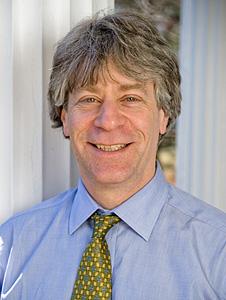November 19, 2009
AMHERST, Mass. — On assignment for Harper’s Magazine, an Amherst College professor with expertise in international war crimes is planning to travel to Munich, Germany in late November for what could be the last major World War II trial involving alleged Nazi perpetrators.
 |
The trial involves charges that Ivan Demjanjuk was a guard at the Sobibor death camp in German-occupied Poland and aided in the killing of 27,900 Jews during World War II. Demjanjuklater moved to Cleveland, where he spent decades as an autoworker, but was finally deported from the United States to Germany in May 2009 to face the charges in a German court.
The trial began Nov. 30. Already, Lawrence Douglas, the James J. Grosfeld Professor of Law, Jurisprudence and Social Thought at Amherst College, who landed the assignment from Harper’s, has also been offering his perspective on the trial to media outlets such as the BBC.
The Demjanjuk case has been the subject of international media attention for years, and the coverage shows no sign of abating. “I’m very excited,” Douglas said. “I think one reason the trial is generating so much attention is because it offers a great occasion for reckoning. It promises to be the last of the high-profile perpetrators’ trials dealing with Nazi atrocities during World War II.”
Douglas’ credentials to cover the trial are impressive. They include extensive scholarship in the area of international war crimes tribunals, fluency in German, familiarity with the German legal system and the details of the case, and previous experience writing about war crimes proceedings, including the trial of Slobodan Milosevic, the former Serbian and Yugoslavian leader who was accused of genocide and other crimes against humanity.
Additionally, Douglas spent last semester in Berlin, as a visiting law professor at Humboldt University. There, he wrote an essay in German on the Demjanjuk case that was published in the Frankfurter Allgemeine Zeitung, a leading German newspaper.
“I’m pretty well-situated,” he said. “I've written a lot about war crimes, especially those associated with the Holocaust. I’ve studied the Nuremberg and Eichmann trials, both in terms of what they contributed to international law and how they served as means of reckoning with history and as tools of democratic transition.”
Although Douglas gives Germany high marks for addressing its Nazi past through the establishment of museums and memorial sites, he says its legacy of doing so within the framework of its legal system is less impressive.
“There are a lot of prosecutors who are eager to use this case as a way of establishing closure and making amends for decades of woeful absence of success in prosecuting war crimes,” he said.
The case may not be cut-and-dried, though, as various issues are sure to be hashed out, from whether Demjanjuk was actually at Sobibor to whether he is physically and mentally fit to undergo the rigors of trial. Although Demjanjuk has presented himself as frail, bordering on senile, Douglas notes that YouTube footage of what appears to be a relatively spry Demjanjuk has cast doubt on those claims. In any event, in a nod to his advanced age, it’s likely that Demjanjuk’s trial will be limited to two 90-minute sessions per day; this could spread the trial out over many months.
“There is a fair amount of disagreement about how unhealthy this guy is,” Douglas said. “If he dies or is otherwise unable to withstand the ordeal of court, it would create its own irony that this trial had to happen so late.”
For more information or to arrange an interview contact Peter Rooney, director of public affairs, Amherst College, 413-542-84542; prooney@amherst.edu.